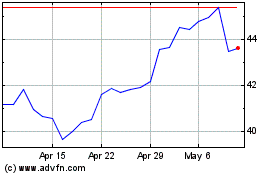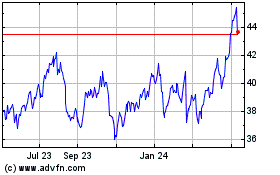By Margot Patrick in London and Julie Steinberg in Hong Kong
Huawei Technologies Co., targeted as a national security threat
by the U.S. and other governments, faces a new risk: reduced access
to the global financial system.
Two banks that helped power the Chinese company's rise as a
global technology supplier, HSBC Holdings PLC and Standard
Chartered PLC, won't provide it with any new banking services or
funding after deciding that Huawei is too high risk, people
familiar with those decisions said.
While HSBC made its decision last year, Standard Chartered moved
more recently as concerns about Huawei escalated this year from a
Justice Department investigation into whether the company violated
U.S. sanctions on Iran, some of the people said.
A third key bank, Citigroup Inc., continues to provide Huawei
with day-to-day banking services outside the U.S., people familiar
with that relationship said. New banking business would be subject
to review, and Citigroup is monitoring continuing developments in
the U.S., the people said.
This month, Huawei's finance chief Meng Wanzhou was arrested in
Canada and awaits possible extradition to the U.S. to face charges
over alleged sanctions violations and bank fraud. Her arrest has
heightened trade tensions between the U.S. and China and has
resulted in a diplomatic spat between China and Canada. Ms. Meng
denies any wrongdoing. Ms. Meng is out on bail with strict limits
on her movements.
Huawei, active in about 170 countries, relies on international
banks to manage cash, finance trade and fund its operations and
investments. For more than a decade, HSBC, Standard Chartered and
Citigroup Inc., another key financier, plugged Huawei into the
global financial system as it entered new markets, providing it
with everything from foreign currencies to bond funding from
Western investors. Chinese banks finance Huawei in some markets but
don't have the reach to service it globally.
Standard Chartered recently decided it had to sever business
with Huawei, people familiar with the matter said. Its relationship
with the company dates back to the 2000s, and includes providing
regional and global cash pools that free up excess cash in local
Huawei units and let it pay suppliers in multiple currencies.
HSBC stopped working with Huawei last year, people familiar with
the matter said, after the bank and a court-appointed monitor
flagged suspicious transactions by the company to U.S. prosecutors
in 2016. According to Canada court filings, HSBC was one of at
least four global banks that Ms. Meng or other Huawei executives
allegedly misled about Huawei's ties to Skycom Tech, a Hong Kong
company operating in Iran. The bank is still a mortgage lender on
two homes Ms. Meng and her husband own in Vancouver, according to
Canada property records.
A Huawei spokesman declined to comment on the company's bank
ties.
Citigroup's relationship with Huawei has included global
transaction banking and trade financing outside of the U.S., in
countries such as Mexico, Pakistan and Bangladesh, according to
public disclosures and people familiar with the relationship. It
also shared the lead role arranging several Huawei loan and bond
deals in recent years, Dealogic data shows.
Around January 2014, the bank instituted a new approach toward
Huawei and other clients it deemed riskier that included
periodically reviewing their transactions, said a person familiar
with the matter.
Goldman Sachs Group Inc. considered extending financing to the
Chinese company in 2013, people familiar with the matter said, but
decided not to, in part because Goldman executives received
negative feedback from the U.S. Treasury.
Other banks that have provided funding or services to Huawei,
including JPMorgan Chase & Co., Australia & New Zealand
Banking Group Ltd. and ING Groep NV, declined to comment on whether
they would enter into new business. An ANZ spokesman said it takes
its due diligence responsibilities very seriously and has detailed
policies and processes in place for use when engaging clients. A
spokesman for ING, whose subsidiary Bank Mendes Gans runs a cash
pool for Huawei in Europe, said the bank takes its sanctions policy
extremely seriously and continually assesses clients for risks.
Huawei, founded in 1987 by a former Chinese army officer, has
been seen as a prize client for Western banks looking to enter
China and help its companies go international. Its perceived ties
to the government, which Huawei denies, initially made Western
banks comfortable to enter business and extend financing at more
favorable terms than other privately owned Chinese companies,
according to executives whose banks sought business with Huawei as
far back as the mid-2000s.
"It's the kind of client Standard Chartered or HSBC would bend
over backwards for," said a former Standard Chartered executive.
"They are everywhere, and need help everywhere."
However, since at least 2007, some U.S. government officials
feared Huawei's telecommunications gear and security software could
pose risks to national security.
A Huawei deputy chairman on Tuesday said there is no evidence to
support claims the company is a cybersecurity threat.
In 2013, Reuters reported Huawei might be operating in Iran
through a closely tied company called Skycom Tech, prompting HSBC
to ask Huawei to explain its relationship to Skycom and business
with Iran, according to Canada court filings related to Ms. Meng's
extradition case. HSBC's questions led to an August 2013 meeting
between Ms. Meng and at least one HSBC executive.
At the meeting, Ms. Meng sought to assuage concerns about
Huawei's potential ties to Skycom and Iran, according to a copy of
her presentation in court filings, stating that Huawei was a former
shareholder in Skycom and that she had once been a board member but
stepped down. In the presentation, Ms. Meng praised HSBC for its
long-running relationship with the company, and "deep understanding
of Huawei's history of growth around the world."
U.S. authorities now allege Ms. Meng misrepresented the ties to
Skycom so that Huawei could keep moving money out of countries
subject to U.S. or European sanctions and into the international
banking system. They say HSBC and other banks cleared hundreds of
millions of dollars of transactions for Huawei that may have
violated sanctions, exposing the firms to "serious harm."
--Telis Demos contributed to this article.
Write to Margot Patrick at margot.patrick@wsj.com and Julie
Steinberg at julie.steinberg@wsj.com
(END) Dow Jones Newswires
December 20, 2018 11:10 ET (16:10 GMT)
Copyright (c) 2018 Dow Jones & Company, Inc.
HSBC (NYSE:HSBC)
Historical Stock Chart
From Mar 2024 to Apr 2024

HSBC (NYSE:HSBC)
Historical Stock Chart
From Apr 2023 to Apr 2024
